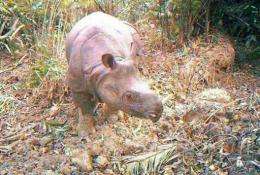In this undated handout picture released by Ujung Kulon national park on December 30, a Javan rhino, part of a group of 35 critically endangered Javan rhinos, is seen at the Ujung Kulon national park. Hidden cameras in the jungles of Indonesia's Java island have captured images of 35 critically endangered Javan rhinos, including five calves, an official said.
Hidden cameras in the jungles of Indonesia's Java island have captured images of 35 critically endangered Javan rhinos, including five calves, an official said Friday.
The forestry ministry set up 44 infrared cameras from January to October this year in the rugged Ujung Kulon National Park on the western-most tip of Java.
"The cameras captured the images of 22 male and 13 female rhinos. The five calves consisted of one female and four males," director of biodiversity conservation at the forestry ministry Bambang Novianto told AFP.
He said the discovery of the five calves "shows that its population continue to develop", but an imbalanced sex ratio could threatened the rare species.
"There are more male rhinos than females. We are worried that it will create dangerous competitions among the male rhinos in getting a partner. They may end up in a deadly fight," he said.
To boost conservation efforts, Novianto said his ministry was finalising a rhino breeding sanctuary in an area of 38,000 hectares inside the 122,000-hectare (300,000-acre) national park.
"It will be easier for us to monitor its population so that the breeding process would be more effective," he said, adding that such programmes will help the government to reach a target of 70 to 80 Javan rhinos by 2015.
The Javan rhino is distinguished from African rhinos by its small size, single horn and loose skin folds.
Around 44 Javan rhinos are believed to live in Ujung Kulon, a rare patch of wilderness on one of the world's most densely populated islands.
They form the world's only viable population of the critically endangered species capable of reproducing.
Asian rhinos have been driven to the brink of extinction because their horns are highly valued in traditional Chinese and Korean medicine, although most countries in the region have banned the trade.
(c) 2011 AFP
























